multivitamin support

free shipping over $100 (USA & Canada)
1-877-937-4372 the pet expert hotline

Herbal Digestive Aid, Energy Booster, and Multivitamin for Cats

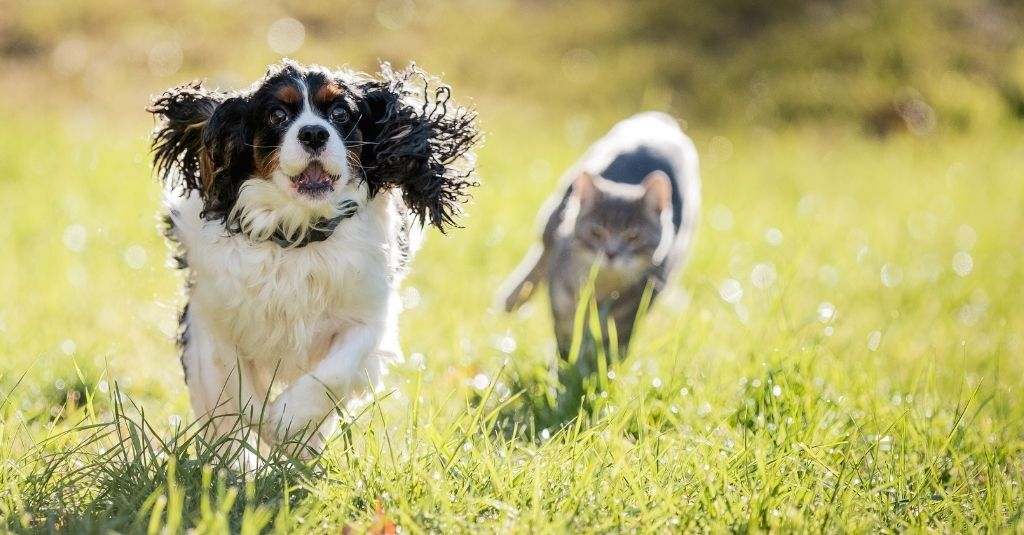
Just like we humans benefit from exercise, our pets do too! All pets need exercise to preserve physical and mental health and use up pent-up energy. Pet parents often ask themselves, “how much exercise do pets need?” While it is a valid question, it is also important to keep in mind that different life stages, species, and health conditions require different amounts and types of exercise.
In this blog, I will talk about exercise for dogs, cats, bunnies, and ferrets. How much exercise is appropriate, according to life stage and health condition? How much exercise is too much?
Dogs generally are active and always want to play, especially if they are puppies when everything is new and fun.
Depending on the breed, age, and individual temperament, your dog may need more exercise than average. But overall, for puppies, exercise always means playtime. Playing fetch or tug, running around, or a walk around the block is always a good idea. Do not over-exercise your pet, as it can be dangerous for their health. For puppies, you can start with 10 minutes of exercise and increase weekly according to their growth.
Adult dogs will let you know how much exercise they need. They are stronger and the amount of exercise will vary accordingly to their temperament. Sometimes, different dogs of the same breed and age will prefer different types of exercise and benefit from a different length of time. Some may have way more energy and will require hours of exercise daily, some will require minutes. If your dog is hyperactive, running and/or swimming might be good options and more effective than just walking.
If your dog has any health condition, such as hip dysplasia, heart issues, arthritis, among other issues, always talk to your veterinarian to decide what type of exercise is best for your furbaby. For example, a pet with heart issues might benefit more from long walks, while a pet with arthritis or hip dysplasia might benefit more from swimming.
If after exercising your dog they are still running around and displaying a lot of energy, they may not have had enough exercise.
If after exercising your dog they are still running around and displaying a lot of energy, they may not have had enough exercise. Too much exercise can be dangerous, and your dog will give you signs that they are tired and don’t want to do that activity anymore. Some signs include panting, refusing to walk/run/fetch more, staying in one spot, refusing to move, and having their tongue out. If you see any of these signs, stop the exercise and give them time to rest. Overexercising can lead to overheating, collapsing, and even fainting and death, so always be aware of your dog’s signs.
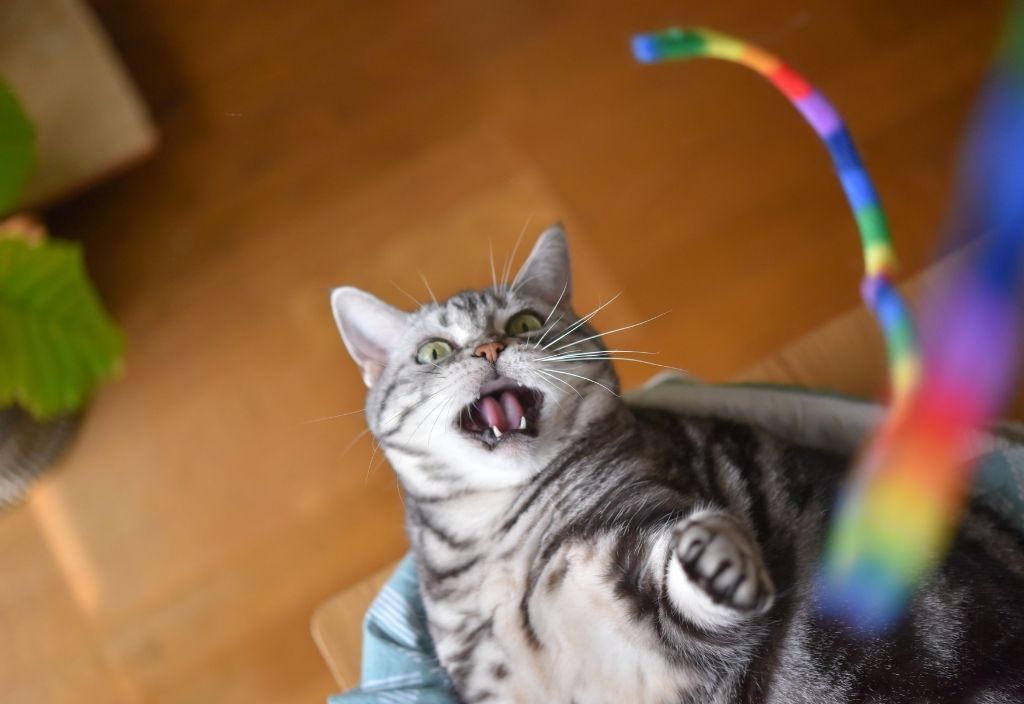
The reason cats and ferrets will be present together is because their metabolism, physiology, and needs are very similar. Their behavior is quite similar as well, including feeding behavior, energy, and ways to play and exercise.
Cats and ferrets love to hunt balls, small toys, lights, and this is a great and fun way to provide them with exercise. If your ferret or cat has a crate, providing multi-level crates with obstacles and platforms may be a great idea to help them stretch and keep up their physical and mental health.
Just like dogs, if they have any health condition it is important to talk to your veterinarian to decide the appropriate type and amount of exercise they need.
And because ferrets and cats have a stronger temperament than dogs, if they don’t want to exercise, they won’t. If they stop playing and running and hunting after a while, just leave them to rest. Always pay attention to their signs as well and if you notice anything wrong, please take them to your trusted veterinarian.
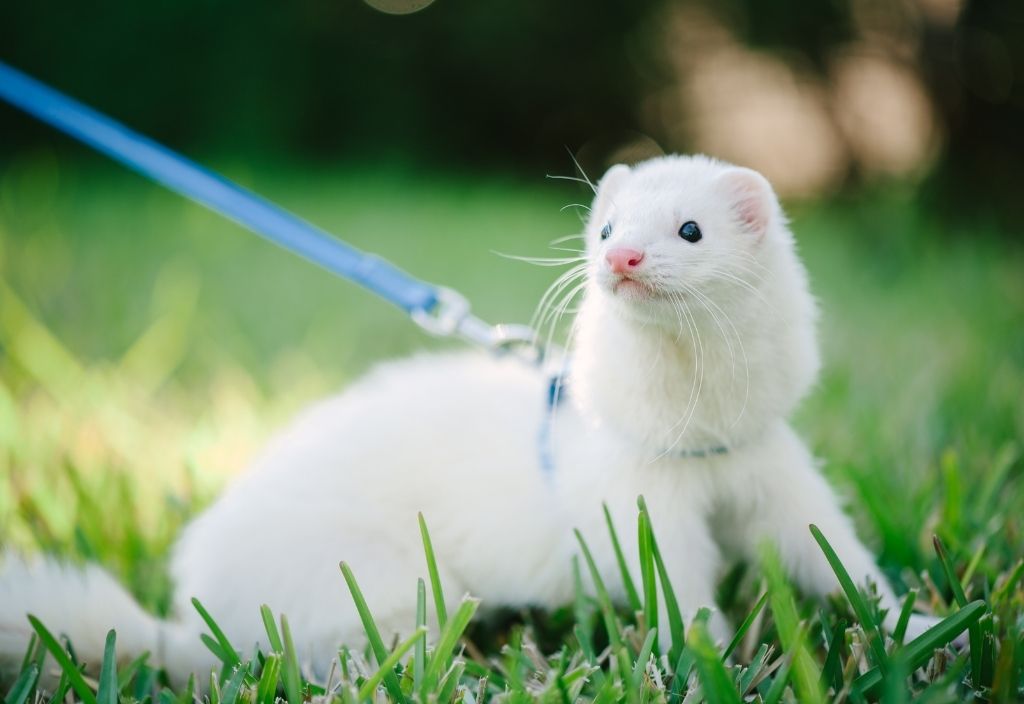
It is really important for rabbits to get enough exercise and prevent issues like obesity. Ideally, they require at least 3 hours of exercise in a large outdoor run, but the more the merrier for these jumpy, fluffy bunnies.
Rabbits usually exercise by running, jumping, digging (they absolutely love to dig!), foraging, gnawing. Rabbits live in burrows in the wild, which explains why they love to dig so much. With foraging in mind, although we do provide them with the food they need, it may be a good idea to build foraging rows, so they can explore and forage some treats. Gnawing is important for them so they can keep their teeth at an ideal length, so it is important to provide them with things that they can gnaw on.
It is not recommended to pick up your rabbit and make them stay on your lap, especially in the beginning. Rabbits are animals that are usually considered prey, they are often very scared of us and can be stressed if we make them be with us all the time.
And just like the other pets we mentioned, it is always important to be aware of signs of exhaustion they can show us, and provide them with the amount and correct type of exercise accordingly to their life stage and health condition.
If ever in doubt, the veterinarian is your best option to assess your questions.
And here at NHV, we can always help you with questions. To keep your adored pet healthy and active, we recommend adding Multi Essentials and Stimmune to their regimen.
Multi Essentials helps fill dietary gaps, support digestion, and provide support with promoting strong muscle and bone growth. It’s high in vitamins, minerals, and antioxidants to ensure your kitten or puppy of any age is getting energy, vitality, and health for a happy life.
Stimmune supports a healthy balance of the immune system in pets to help their immune system keep functioning properly.
If you have any questions about your pet’s health, you can reach out to our team of pet experts by clicking the chat button below.
multivitamin support

Herbal Digestive Aid, Energy Booster, and Multivitamin for Dogs
buy 2 and save $3
3 month supply for a small to medium size pet
NHV’s multivitamins for dogs targets the brain, stomach, major arteries, kidneys, and liver with a powerful blend of herbal support.


NHV’s multivitamins for dogs targets the brain, stomach, major arteries, kidneys, and liver with a powerful blend of herbal support.

Millions of people take multivitamins daily to support their health, and it only makes sense our canine companions can benefit just as much. This 100% natural plant-based liquid blend can help your dog with nutritional deficiencies.
Signs of Possible Vitamin Deficiency in Dogs
NHV’s Multi-Essentials are packed with herbs that are rich in vitamins and minerals. This vet-formulated blend is designed to benefit your dog’s health using all-natural organically grown herbs with no additives or preservatives.
Even if your pet is healthy, supplying a multivitamin is essential to maintain good health, and some pets need more vitamins and minerals than others. For more, read NHV’s blog, vet talk with Dr. Hillary Cook.
Benefits of NHV’s Multivitamins for Dogs
You can read NHV's blog about the importance of dog vitamin supplements. All pets can benefit from NHV’s Natural Pet Product, even small exotic pets.
If you have questions about plant-based supplements including our multivitamins for dogs, you can schedule a consultation with one of our highly trained holistic veterinarians, because, at NHV, total health and wellness for all pets is our top priority.
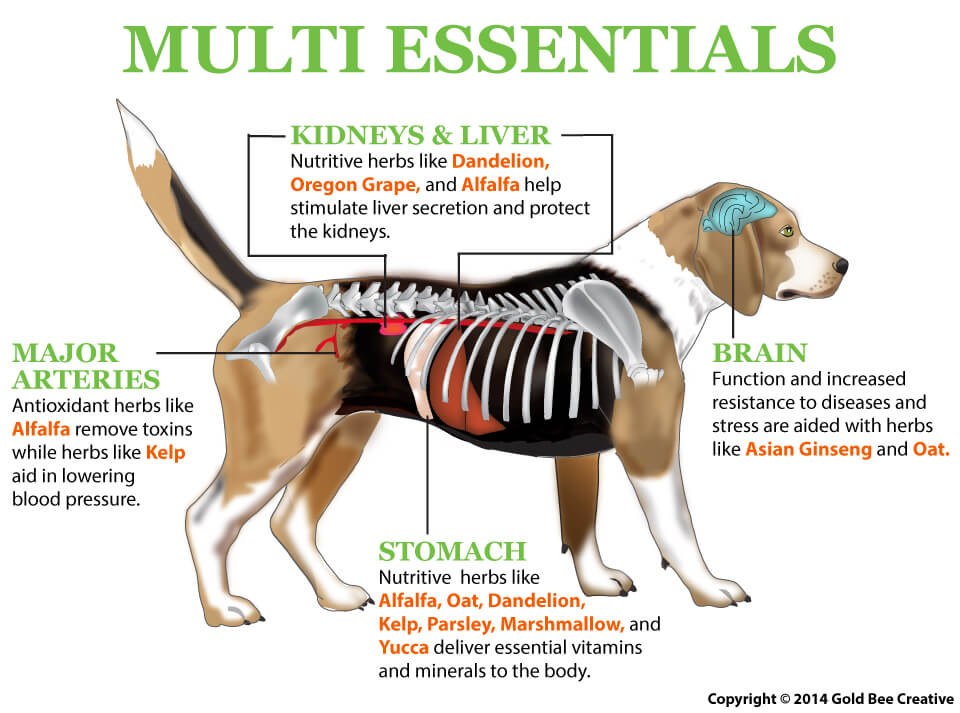
Select your pet's weight to determine the correct dose.
To be taken twice daily. Determine your pet’s weight and then use the easy chart below to determine the correct dose. This is the minimum dosage.
Pet's Weight Dosage
0 - 15 lb = 0.5 ml
16 - 30 lb = 1.0 ml
31 - 45 lb = 1.5 ml
46 - 60 lb = 2.0 ml
61 - 75 lb = 2.5 ml
Over 75 lb = 3.0 ml
How to Administer
Shake well before use. The easiest method is to use the dropper provide and places the drops into your pet’s food or favorite treat. You can also use the dropper and squirt directly into the pet’s mouth.
Some pets can be finicky, if this occurs consider hiding the drops in foods most pet’s love such as fish, chicken or yogurt or a favourite treat. If your pet only eats dry food then soak a few kibbles at feeding time.
For Best Results
Herbal dietary supplements are beneficial to the health and wellbeing of your pet and are safe for long-term use. Every pet responds to natural herbal supplements differently, therefore it is important to be consistent and administer the product daily. Supplements generally take two to four weeks to take effect, however this will vary from one animal to the next.
Product Storage
All NHV Natural Pet Products are pure herbal extracts and contain no artificial additives, preservatives or coloring. Shelf life after opening is 6 months and must be refrigerated after opening.
Cautions and Contraindications
Do not use Multi Essentials in pregnant or nursing animals. Speak to your vet before using our products. A second visit is recommended if your pet’s condition does not improve, or deteriorates after continued use of the supplements.
All information provided by NHV Natural Pet Products is for educational purposes only.
Millions of people take multivitamins daily to support their health, and it only makes sense our canine companions can benefit just as much. This 100% natural plant-based liquid blend can help your dog with nutritional deficiencies.
Signs of Possible Vitamin Deficiency in Dogs
NHV’s Multi-Essentials are packed with herbs that are rich in vitamins and minerals. This vet-formulated blend is designed to benefit your dog’s health using all-natural organically grown herbs with no additives or preservatives.
Even if your pet is healthy, supplying a multivitamin is essential to maintain good health, and some pets need more vitamins and minerals than others. For more, read NHV’s blog, vet talk with Dr. Hillary Cook.
Benefits of NHV’s Multivitamins for Dogs
You can read NHV's blog about the importance of dog vitamin supplements. All pets can benefit from NHV’s Natural Pet Product, even small exotic pets.
If you have questions about plant-based supplements including our multivitamins for dogs, you can schedule a consultation with one of our highly trained holistic veterinarians, because, at NHV, total health and wellness for all pets is our top priority.

Select your pet's weight to determine the correct dose.
To be taken twice daily. Determine your pet’s weight and then use the easy chart below to determine the correct dose. This is the minimum dosage.
Pet's Weight Dosage
0 - 15 lb = 0.5 ml
16 - 30 lb = 1.0 ml
31 - 45 lb = 1.5 ml
46 - 60 lb = 2.0 ml
61 - 75 lb = 2.5 ml
Over 75 lb = 3.0 ml
How to Administer
Shake well before use. The easiest method is to use the dropper provide and places the drops into your pet’s food or favorite treat. You can also use the dropper and squirt directly into the pet’s mouth.
Some pets can be finicky, if this occurs consider hiding the drops in foods most pet’s love such as fish, chicken or yogurt or a favourite treat. If your pet only eats dry food then soak a few kibbles at feeding time.
For Best Results
Herbal dietary supplements are beneficial to the health and wellbeing of your pet and are safe for long-term use. Every pet responds to natural herbal supplements differently, therefore it is important to be consistent and administer the product daily. Supplements generally take two to four weeks to take effect, however this will vary from one animal to the next.
Product Storage
All NHV Natural Pet Products are pure herbal extracts and contain no artificial additives, preservatives or coloring. Shelf life after opening is 6 months and must be refrigerated after opening.
Cautions and Contraindications
Do not use Multi Essentials in pregnant or nursing animals. Speak to your vet before using our products. A second visit is recommended if your pet’s condition does not improve, or deteriorates after continued use of the supplements.
All information provided by NHV Natural Pet Products is for educational purposes only.
multivitamin support

All-Natural Multivitamin for Pocket Pets
buy 2 and save $3
3 month supply for a small to medium size pet
As pet parents, we all want our pets to live long and happy lives. To help your gerbil, teddy bear hamster, or hairless guinea pig age gracefully, our pocket pet supplements are formulated to deliver vital nutrients, help maintain many body processes and encourage healthy skin and coat.


As pet parents, we all want our pets to live long and happy lives. To help your gerbil, teddy bear hamster, or hairless guinea pig age gracefully, our pocket pet supplements are formulated to deliver vital nutrients, help maintain many body processes and encourage healthy skin and coat.

Pocket pets are small animals that include:
A vitamin deficiency can have detrimental effects on a pocket pet’s health and may lead to many different health conditions. A long and healthy life starts with good nutrition, so for pet parents looking for natural supports for their teddy bear hamster, gerbil, or chinchilla, our Multi Essentials for Pocket Pets offers a liquid formulation made with a blend of 11 nutrient-dense herbs formulated to help maintain many body processes, help metabolize vitamins and minerals, and aid digestion. It is beneficial support for pocket pets exposed to environmental toxins as well as encourages healthy skin and coat. All of our supplements are made with full-spectrum plant extracts that are crafted specifically for pets of all sizes. Full-spectrum means that all of the vitamins, minerals, and trace elements are kept intact during the extraction process to make it easily absorbable for your pocket pet.
Having an imbalanced diet can cause a lot of stress and discomfort for your furry friend. Our Multi Essentials for Pocket Pets is an all-natural herbal remedy formulated to help fill nutritional voids, help reduce fatigue and help to improve digestion.
Common health issues caused by a nutrient deficiency:
With NHV Supplements, you can give your furkiddo the extra support they need to age gracefully! All of our care products are created with 100% organic or wildcrafted ingredients and can be used safely alongside vet-prescribed medication. If you have any questions about pet supplements or holistic remedies, Get in touch with an NHV Pet Expert - we’re here for you every step of the way!
Made with the finest, organically grown, or ethically harvested herbs. Made specifically for pets, vet-formulated and vet approved.
Select your pet's weight to determine the correct dose.
For ferrets: 0.5ml twice a day
For rabbits and guinea pigs: 0.5 ml twice a day
For hamsters and mice: 1 drop per two pounds twice a day
How to Administer
Shake well before use. The easiest method is to use the dropper provide and place the drops into your bird's favorite treat. You can also use the dropper and squirt directly into the bird’s mouth.
For Best Results
Herbal dietary supplements are beneficial to the health and wellbeing of your pet and are safe for long-term use. Every pet responds to natural herbal supplements differently, therefore it is important to be consistent and administer the product daily. Supplements generally take two to four weeks to take effect, however this will vary from one animal to the next.
Product Storage
All NHV Natural Pet Products are pure herbal extracts and contain no artificial additives, preservatives or coloring. Shelf life after opening is 6 months and must be refrigerated after opening.
Cautions and Contraindications
Do not use Multi Essentials in pregnant or nursing animals. Speak to your vet before using our products. A second visit is recommended if your pet’s condition does not improve, or deteriorates after continued use of the supplements.
All information provided by NHV Natural Pet Products is for educational purposes only.
Pocket pets are small animals that include:
A vitamin deficiency can have detrimental effects on a pocket pet’s health and may lead to many different health conditions. A long and healthy life starts with good nutrition, so for pet parents looking for natural supports for their teddy bear hamster, gerbil, or chinchilla, our Multi Essentials for Pocket Pets offers a liquid formulation made with a blend of 11 nutrient-dense herbs formulated to help maintain many body processes, help metabolize vitamins and minerals, and aid digestion. It is beneficial support for pocket pets exposed to environmental toxins as well as encourages healthy skin and coat. All of our supplements are made with full-spectrum plant extracts that are crafted specifically for pets of all sizes. Full-spectrum means that all of the vitamins, minerals, and trace elements are kept intact during the extraction process to make it easily absorbable for your pocket pet.
Having an imbalanced diet can cause a lot of stress and discomfort for your furry friend. Our Multi Essentials for Pocket Pets is an all-natural herbal remedy formulated to help fill nutritional voids, help reduce fatigue and help to improve digestion.
Common health issues caused by a nutrient deficiency:
With NHV Supplements, you can give your furkiddo the extra support they need to age gracefully! All of our care products are created with 100% organic or wildcrafted ingredients and can be used safely alongside vet-prescribed medication. If you have any questions about pet supplements or holistic remedies, Get in touch with an NHV Pet Expert - we’re here for you every step of the way!
Made with the finest, organically grown, or ethically harvested herbs. Made specifically for pets, vet-formulated and vet approved.
Select your pet's weight to determine the correct dose.
For ferrets: 0.5ml twice a day
For rabbits and guinea pigs: 0.5 ml twice a day
For hamsters and mice: 1 drop per two pounds twice a day
How to Administer
Shake well before use. The easiest method is to use the dropper provide and place the drops into your bird's favorite treat. You can also use the dropper and squirt directly into the bird’s mouth.
For Best Results
Herbal dietary supplements are beneficial to the health and wellbeing of your pet and are safe for long-term use. Every pet responds to natural herbal supplements differently, therefore it is important to be consistent and administer the product daily. Supplements generally take two to four weeks to take effect, however this will vary from one animal to the next.
Product Storage
All NHV Natural Pet Products are pure herbal extracts and contain no artificial additives, preservatives or coloring. Shelf life after opening is 6 months and must be refrigerated after opening.
Cautions and Contraindications
Do not use Multi Essentials in pregnant or nursing animals. Speak to your vet before using our products. A second visit is recommended if your pet’s condition does not improve, or deteriorates after continued use of the supplements.
All information provided by NHV Natural Pet Products is for educational purposes only.
immune & allergy support

Holistic Remedy for Food Allergies and Immune Support in Cats
buy 2 and save $3
3 month supply for a small to medium size
Helps your cat overcome food allergies, skin allergies, and fight infection.

Helps your cat overcome food allergies, skin allergies, and fight infection.
Cats can be allergic to the things they eat and touch, just like people can. With NHV’s Stimmune, your kitty will get potent immune supporting herbs that help support your cat with food allergy reactions, as well as reactions related to fleas, dermatitis, insect bites, diet, and exposure to chemicals and drugs. For seasonal or environmental allergies, please try Alge-Ex for a remedy specifically formulated for your cat.
At NHV, all of our pet products are formulated by a master herbalist as well as a holistic veterinarian having more than 20 years of experience. Some ingredients are even wild-crafted which means they were ethically harvested from their natural environment. Our products are also safe for long-term use and are supplements that animals like to take, including finicky kitties.
If you have questions about holistic remedies for cat allergies to food or any of our wide variety of products, you can ask an NHV expert. Our very supportive professional team of pet experts are here to help and recommend supplements because, at NHV, we want your kitty feeling pawtastic naturally!
Stimmune Is Also Helpful for:
Cats can get food allergies from their diet, and other allergies from their environment when allergens are inhaled, ingested, or absorbed by the body. Once this happens, the immune system overreacts, and this is when your kitty will need extra balance and support.
Read about a senior cat’s Helenda’s transformation using Stimmune.
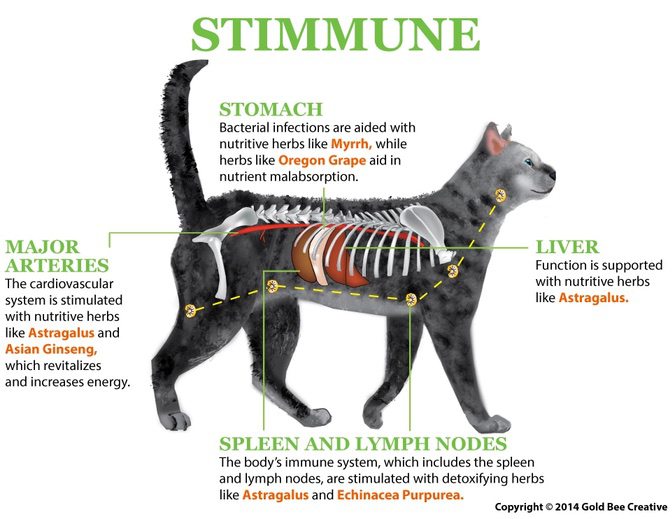
How NHV’s Stimmune Helps Allergies in Cats
Stimmune promotes healthy immune activity and histamine response with five natural herbs formulated to reduce environmental allergies in cats.
Stimmune provides support in addition to conventional treatment for all forms of allergies including pollen allergies in cats.
Select your pet's weight to determine the correct dose.
Cats can be allergic to the things they eat and touch, just like people can. With NHV’s Stimmune, your kitty will get potent immune supporting herbs that help support your cat with food allergy reactions, as well as reactions related to fleas, dermatitis, insect bites, diet, and exposure to chemicals and drugs. For seasonal or environmental allergies, please try Alge-Ex for a remedy specifically formulated for your cat.
At NHV, all of our pet products are formulated by a master herbalist as well as a holistic veterinarian having more than 20 years of experience. Some ingredients are even wild-crafted which means they were ethically harvested from their natural environment. Our products are also safe for long-term use and are supplements that animals like to take, including finicky kitties.
If you have questions about holistic remedies for cat allergies to food or any of our wide variety of products, you can ask an NHV expert. Our very supportive professional team of pet experts are here to help and recommend supplements because, at NHV, we want your kitty feeling pawtastic naturally!
Stimmune Is Also Helpful for:
Cats can get food allergies from their diet, and other allergies from their environment when allergens are inhaled, ingested, or absorbed by the body. Once this happens, the immune system overreacts, and this is when your kitty will need extra balance and support.
Read about a senior cat’s Helenda’s transformation using Stimmune.

How NHV’s Stimmune Helps Allergies in Cats
Stimmune promotes healthy immune activity and histamine response with five natural herbs formulated to reduce environmental allergies in cats.
Stimmune provides support in addition to conventional treatment for all forms of allergies including pollen allergies in cats.
Select your pet's weight to determine the correct dose.
Published: September 9, 2021